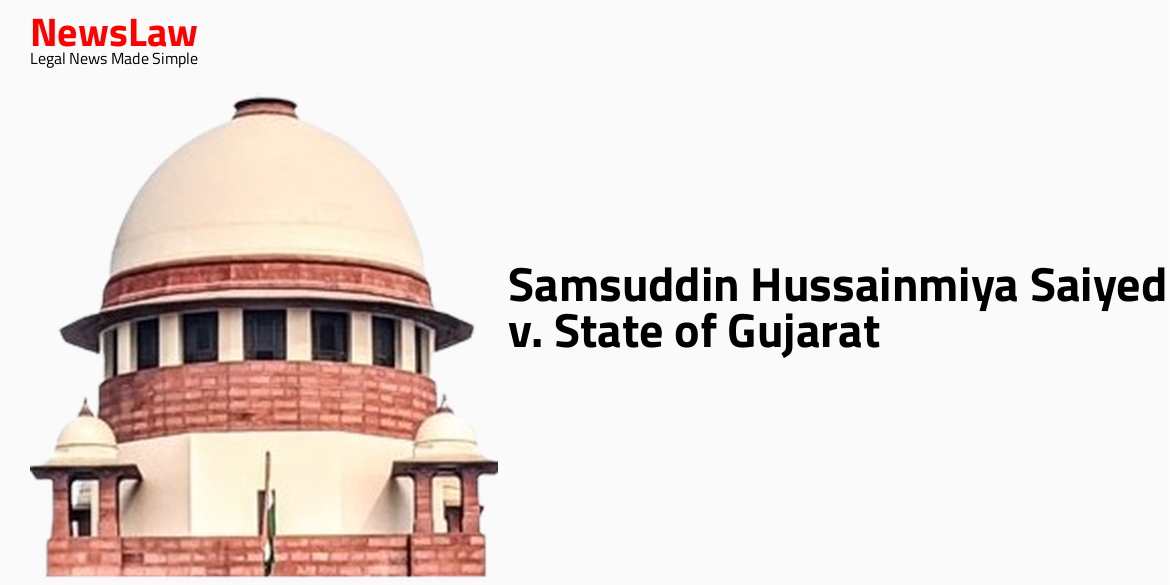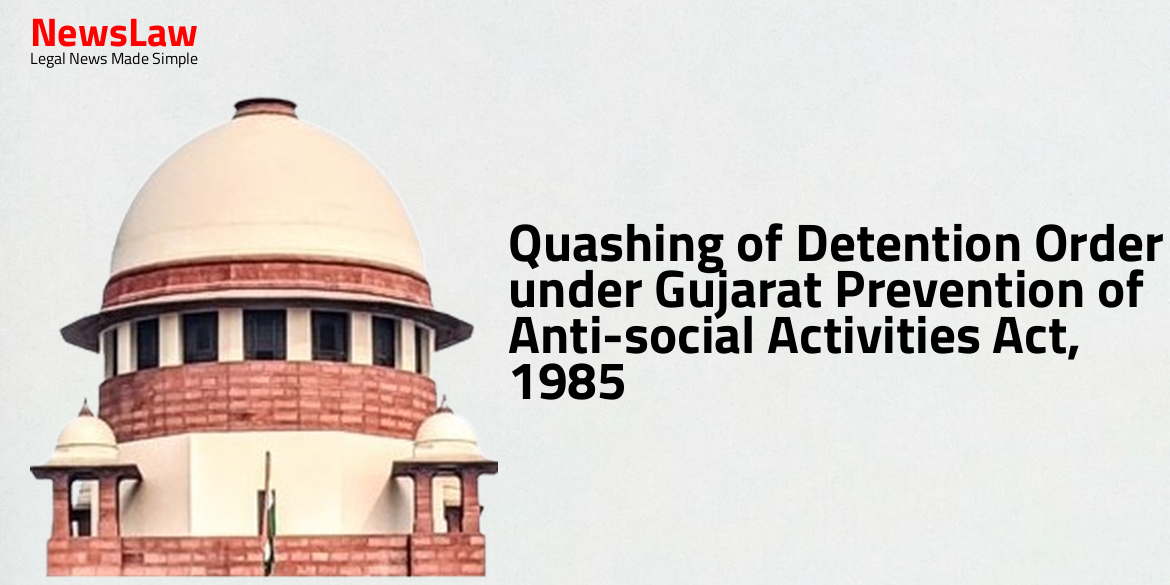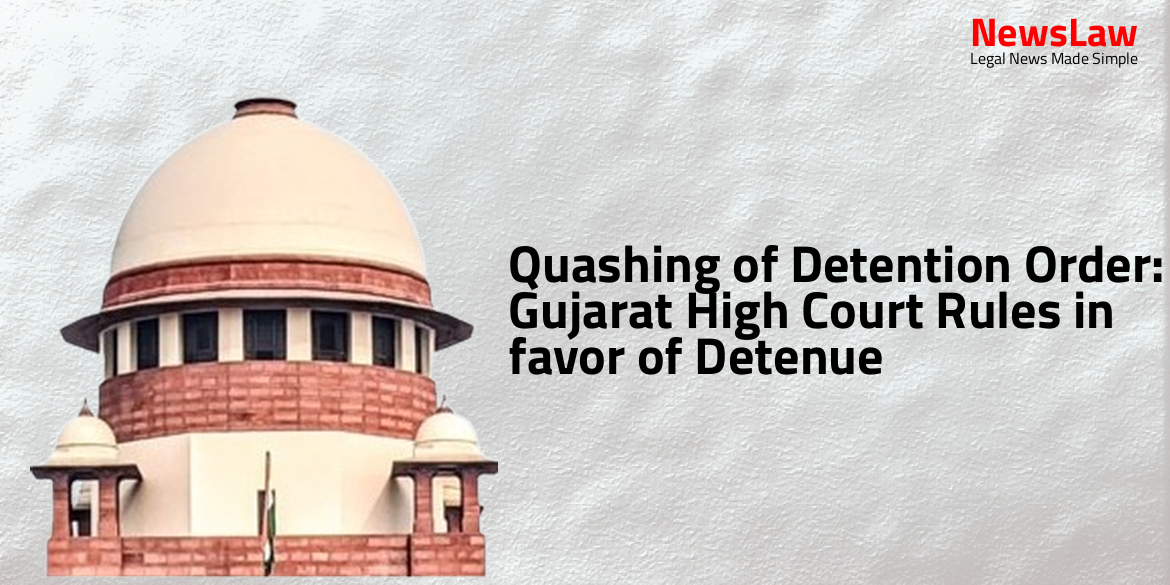In a recent ruling by the Gujarat High Court, the case of Samsuddin Hussainmiya Saiyed v. State of Gujarat has brought to light crucial aspects of bail applications under the NDPS Act. The Court’s decision in this case holds significance in the context of drug-related offences and the stringent conditions imposed for bail. Let’s delve into the details of this important legal judgment.
Facts
- The police received a tip-off regarding the presence of contraband substance heroin in a newly constructed house near Samsuddin Hussainmiya Saiyed’s residence.
- The information was reduced into writing and the superior officer instructed a raid to be carried out.
- During the raid, contraband substance samples tested positive for heroin.
- Jabbar Jodiya and Gulam Bhagad were found in the house and admitted to the possession of the contraband substance.
- The police found suspicious substances hidden under mattresses in plastic bags and questioned the individuals about it.
- Samsuddin Hussainmiya Saiyed claimed ignorance about the bags and stated they belonged to Jabbar Jodiya, Isha Rav, and Gulamhussain Umar Bhagad.
- Personal searches were conducted but nothing objectionable was found.
- Subsequently, the police called out Jabbar Jodiya and Gulam Bhagad who identified themselves and confirmed their ownership of the contraband substance.
- The police informed the individuals about the illegal possession of heroin and proceeded to search the premises.
Arguments
- The narcotic substance heroin recovered is commercial in nature, implicating section 37 of the NDPS Act.
- Applicant-accused not named in the FIR, implicated based on co-accused’s statement.
- No evidence presented by the investigating agency to establish charges against the applicant-accused.
- Applicant-accused was not found in possession of the contraband during the raid.
- Implicated based on co-accused’s statement, not conscious possession.
- Applicant-accused, aged 57, has been in judicial custody since 27.11.2021.
- Investigation completed and charge-sheet filed, other co-accused already on bail.
- Applicant-accused allegedly involved in transporting heroin from Gujarat to Delhi under instructions.
- No recovery of any Muddamal article at the instance of the applicant-accused.
- Confessional statement made by the accused does not have evidentiary value.
- Applicant-accused in jail for over two years, seeks bail based on facts presented.
- The respondent-State opposes grant of regular bail for the applicant-accused.
- The learned APP argues that the role attributed to the applicant-accused makes this a fit case for not exercising discretionary power in favor of the applicant-accused.
Analysis
- The court needs to be satisfied before granting bail about the scheme of Section 439 of the Code, which limits the court’s discretion by placing additional factors.
- The recovery of a significant amount of heroin and its devastating impact on society led to stringent conditions for bail under the Act.
- The legislative intent and mandate of the Act must be considered when deciding bail in such cases.
- Dual conditions for bail require reasonable grounds to prevent the accused from repeating the offense and harming society.
- The term ‘reasonable grounds’ is flexible and based on the surrounding facts of each case.
- The court must record reasonable grounds before granting bail to the accused, as mandated by the legislative intent.
- The accused’s involvement in drug trafficking activities and implications for society necessitate stringent bail conditions under the Act.
- The role and activities of the accused as a drug peddler indicate a high risk of repeating the offense if released on bail.
- Parity cannot be claimed in bail decisions if roles and activities of co-accused differ significantly.
- The court must exercise discretion based on the provisions and objectives of the NDPS Act, considering the seriousness of drug-related offenses.
- Offences under the NDPS Act are cognizable and non-bailable.
- Bail cannot be granted for offences under sections 19, 24, or 27A, and for offences involving commercial quantity without meeting prescribed conditions.
- Conditions include hearing the Public Prosecutor and court satisfaction based on reasonable grounds of innocence and likelihood to not commit similar offences.
- Section 37 of the Act reiterates that offences under NDPS Act are cognizable and non-bailable.
- In cases of murder, accused only commits murder of one or two persons, while those dealing in narcotic drugs cause death or inflict death-blow to numerous innocent victims.
- Drug traffickers have a deadly impact on society and are hazardous, likely to continue illegal activities even if released temporarily.
- Supreme Court reiterates the seriousness of offences under the NDPS Act and sets stringent parameters for granting bail under Section 37.
- The court must consider the objectives of the Act and potential consequences of releasing accused on bail.
- Reasonable grounds under Section 37(b)(ii) require more than mere satisfaction on a prima facie opinion.
- Special court and High Court rulings on bail differ based on possession of seized substances and involvement of other family members.
- Section 37 requires substantial probable causes to believe the accused is not guilty of the offence charged.
- Supreme Court case of Union of India v. Ram Samujh emphasized the necessity of substantial facts and circumstances to justify the belief in the accused’s innocence.
- Supreme Court overturned a bail order in an NDPS Act case where substantial grounds for belief in the accused’s innocence were lacking.
- Total quantity of contraband recovered is 118.650 kg falling under commercial quantity under Section 37 of the NDPS Act.
- The embargo of Section 37 applies due to the quantity of contraband involved.
- No reasonable grounds to believe the applicant is not guilty of the offence.
- The contraband substance is commercial in nature, leading to denial of bail benefits under Section 37 NDPS Act.
Decision
- The Rule has been discharged.
- The instant bail application is rejected.
Case Title: SARJERAO KESHAVRAO GARAD Vs. STATE OF GUJARAT
Case Number: R/CR.MA/7825/2024



